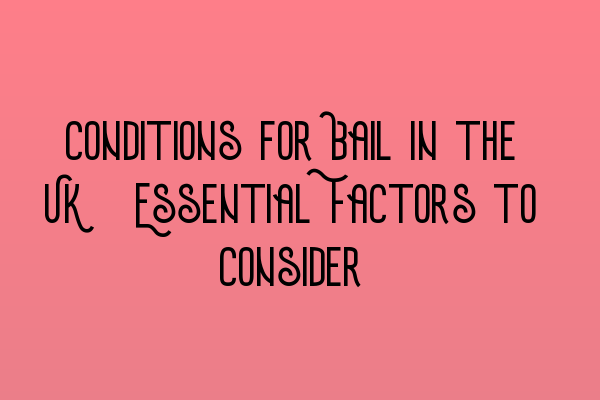Conditions for Bail in the UK: Essential Factors to Consider
When it comes to the criminal justice system in the United Kingdom, one important aspect that plays a critical role in ensuring fair trials and maintaining a balance between the rights of the accused and the interests of justice is the concept of bail. Bail allows individuals accused of a crime to be released from custody while awaiting trial.
Factors Considered for Granting Bail
Before granting bail, various factors are taken into consideration by the courts to assess the risk posed by the individual and determine whether bail should be granted and, if so, what conditions should be imposed. The key factors typically considered include:
- Flight Risk: The likelihood of the accused fleeing the jurisdiction or failing to appear in court is a crucial factor that the court considers. If the accused has strong ties to the community, such as family, employment, or a fixed address, it can help demonstrate a lower flight risk. However, if there is a history of absconding or a lack of ties, the court may require stricter bail conditions.
- Public Safety: The safety of the public is paramount. The court evaluates whether the accused poses a risk to the public if released on bail. Factors such as the nature of the offense, any previous violent or serious criminal history, or indications of potential harm to others can influence the decision to grant bail. In cases where public safety is a concern, the court may impose stringent conditions or deny bail.
- Reoffending Risk: The likelihood of the accused committing further offenses or interfering with witnesses is another crucial factor. A history of previous offenses, pending investigations, or indications of attempts to obstruct justice can impact the decision on granting bail. In such cases, the court may impose conditions aimed at minimizing the risk of reoffending or tampering with evidence.
- Failure to Surrender: The court examines the accused’s past behavior in relation to complying with court orders. If there is a significant history of failing to surrender to custody or comply with bail conditions, it can diminish the chances of being granted bail or lead to stricter conditions being imposed.
- Community Ties: A positive aspect that can support the granting of bail is strong community ties. This includes factors such as having a stable residence, steady employment, family support, and a history of obeying court orders. Demonstrating that the accused is deeply embedded in the community can enhance the chances of bail being granted.
- Special Circumstances: The court takes into account any special circumstances surrounding the case or the accused that may influence the decision. These could include medical conditions, mental health issues, or exceptional personal circumstances. In such situations, the court may tailor the bail conditions to address these specific factors.
Imposing Bail Conditions
When bail is granted, the court has the power to impose conditions to mitigate any perceived risks. These conditions can vary depending on the circumstances of the case and the individual. Some commonly imposed bail conditions include:
- Residence: The accused may be required to reside at a specific address and notify the authorities if they intend to change their address.
- Reporting: Regular reporting to a police station or a designated officer may be a condition of bail.
- Curfew: The court may impose a curfew, requiring the accused to remain at a specified location during specific hours.
- Surrendering Passport: In cases where flight risk is a concern, the court may require the accused to surrender their passport and any travel documents.
- Non-Contact: Restraining the accused from contacting certain individuals, particularly victims or witnesses, to prevent interference with the investigation or potential harm.
- Prohibited Activities: The court may prohibit the accused from engaging in certain activities related to the offense or impose restrictions on alcohol or drug consumption.
- Security: Requiring a financial security or surety to be provided as a condition of bail is another option available to the court.
It is important to note that each case is unique, and the specific conditions imposed will depend on the circumstances and the court’s assessment of the risks involved.
Conclusion
Bail is a fundamental aspect of the criminal justice system in the UK, providing individuals with the opportunity to await trial outside of custody. The decision to grant bail and the conditions imposed depend on a comprehensive evaluation of factors such as flight risk, public safety, reoffending risk, community ties, and special circumstances. By carefully considering these factors, the courts aim to strike a balance between the rights of the accused and the interests of justice.
For further information on SQE exams and preparation, you may find the following articles useful:
- SQE 1 Practice Exam Questions
- SQE 1 Practice Mocks FLK1 FLK2
- SQE 2 Preparation Courses
- SQE 1 Preparation Courses
- SRA SQE Exam Dates
